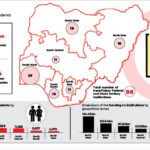
On Friday, here in Atlanta, I witnessed a communication breakdown between a Nigerian English speaker and a UK-born American English speaker that speaks to a larger problem in the Anglophone world: the isolation of native English speakers from the unique expressive styles of non-native English speakers, who now constitute the majority of English speakers worldwide.
The native speaker said he would like to visit Nigeria someday, and his Nigerian interlocutor said, “Make sure you don’t visit when there is fuel scarcity.” The British American looked manifestly bewildered. He had no clue what the Nigerian meant to say.
I knew he didn’t understand what “fuel scarcity” meant, not because it’s outside his experiential radar, but because the phraseology is quaint and unfamiliar. The Nigerian strained hard to explain herself, but the British American was still lost. So I intervened and said, “By fuel scarcity she meant gas shortages.” Then the man understood her. “Oh, I see. I can deal with that,” he said.
In my April 10, 2016 column titled, “‘Premium Motor Spirit Otherwise Known as Petrol’ and Other Petrol-Inspired Grammatical Boo-boos” I pointed out Nigerian English’s tendency to use “fuel” as a synonym for “petrol” was universally applicable in the English-speaking world. I wrote: “When Nigerian journalists don’t call petrol ‘premium motor spirit,’ they call it ‘fuel.’ In both American and British English, fuel is not necessarily synonymous with petrol. Among its many meanings, fuel is the umbrella term for all substances that produce energy such as coal, petrol (which Americans call gasoline or gas for short), kerosene, diesel, petrol, and liquefied petroleum gas. So if kerosene, diesel, liquefied gas, etc. are not in short supply, we can’t legitimately say there is ‘fuel shortage’ or, as Nigerians like to say, ‘fuel scarcity.’ We can only say there is ‘petrol shortage.’
“But I have come to accept ‘fuel’ as Nigerian English’s synonymous term for petrol or gasoline. When I write for a Nigerian audience I too habitually-and intentionally- interchange the two terms…”
I can almost bet that no non-native English speaker would have a hard time understanding what “fuel scarcity” means. In other words, the multiplicity of non-native English varieties in the world share more similarities with each other than they do with native varieties. That’s ironic because all non-native English varieties evolved from native, mostly British, English varieties.
Idioms are at the heart of the intelligibility problems between native and non-native English speakers. Just like native speakers struggle with understanding the creative contortion of their language by non-native speakers, many non-native English speakers have great difficulties with English idioms because of their opacity and cultural specificity.
That was why when English was adopted as the mandatory language of aviation in the world in 2008, the International Civil Aviation Organisation (ICAO), said pilots who are native English speakers should limit “the use of idioms, colloquialisms and other jargon” during communication so that non-native speakers can understand them without difficulty.
A December 14, 2017 article in the (British) Telegraph titled, “Idiomatic English means Brits struggle to communicate with the world” captured this really well. I’ve decided to share it with you, my reader. Enjoy:
By Olivia Rudgard, social affairs correspondent
It’s a theory which is bound to put the cat among the pigeons. The British are proud of the idiomatic humour of their language.
But an academic has argued that they are actually falling behind because they insist on using phrases that the rest of the world does not understand.
Professor Jennifer Jenkins, chair of Global Englishes at the University of Southampton, says that people who speak English as a first language are bad at changing their speech to suit non-native speakers, meaning they struggle to be understood.
The divide means those who speak English as a second language speak it very differently to native speakers – and the two groups are increasingly unable to understand each other, she argues.
Native speakers are also unwilling to make allowances for others by changing their speech patterns or slowing them down – meaning they struggle to socialise with non-native speakers who are better able to communicate with each other in English than they are with the British.
The dynamic means the two groups could be unable to understand each other in as little as a decade – putting native speakers at a disadvantage with the rest of the world.
Her research has included speaking to students on Erasmus programmes, which allow students from different EU countries to study abroad.
In one case she interviewed Hungarian, German and Italian students who said they could speak to each other with perfect ease but only had trouble when a native English speaker joined the conversation.
“Not only did the British keep to themselves but they also said that they get along very well, they understand each other, and the only trouble comes when a really British person comes and joins the conversation,” she told The Telegraph.
In another case, interviews with 34 PhD non-British students who spoke English revealed that they struggled to understand their British counterparts who “didn’t make any allowances for the fact that they came from a different language, they spoke very very fast, used very idiomatic language, they joked a lot, the lecturers joked a lot, using very British-referenced jokes,” she said.
The theory appears in a new book, Languages After Brexit, as part of an essay in which Professor Jenkins argues that native English speakers are worse at communicating clearly than people who have it as a second language.
She cites one case where an interviewer on BBC Radio 3 asks Italian opera singer Roberto Alagna whether his trip to London was “going swimmingly”.
“It was clear that Alagna did not have any idea of what this opaque idiom meant, and the interviewer, after an uncomfortable pause, realised this and asked instead ‘Is it going well?’” the article says.
Another interviewer, a Channel 4 news presenter who was bilingual, asked then-French presidential candidate Emmanuel Macron how he would challenge the country’s rightward move by asking “So how would you buck that trend?” leaving Macron confused.
“While in both cases, the interviewer, especially the second one, was able to paraphrase fairly speedily (which is by no means always the case), these two anecdotes demonstrate that native speakers who have experience of speaking English with non-natives, and even those who have other languages, may find it problematic to adjust spontaneously away from their local use of English,” Professor Jenkins adds.
She argues that the dynamic is causing a divide as other countries see the English as aloof because they insist on using their own language instead of learning others.
“It’s seen as a sort of laziness, as an arrogance, people seem to think that people are unwilling to make the effort,” she said.
English, as spoken by foreign countries, is also developing new grammar rules which are seen as incorrect by native speakers but are valued abroad because they are logical and efficient.
For example, nouns which do not become plural in native English, such as “feedback” or “information”, are made plural by foreign speakers into “feedbacks” or “informations”.
 Join Daily Trust WhatsApp Community For Quick Access To News and Happenings Around You.
Join Daily Trust WhatsApp Community For Quick Access To News and Happenings Around You.


